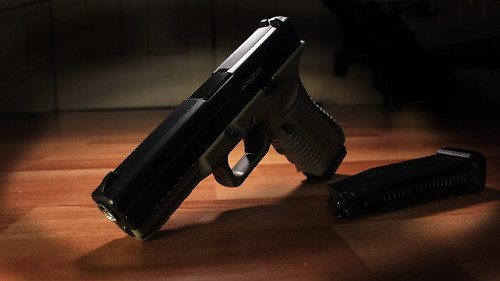Operation complexity
The leading factor in the list to consider when searching for a first firearm is undoubtedly the simplicity of usage. Basically, a Glock pistol is a semi-automatic and it operates through a striker-firing system. To experienced shooters, the Glock firing system might seem to be very straightforward and very simple, but the complexity of the operation of a Glock could be a burden for beginners.
Those who have no shooting experience at all might have difficulty in understanding the process of loading, unloading, and handling a Glock gun. As a result, this complexity can be the source of various safety issues if the person operating the weapon is not quite confident about the safe procedure.
Trigger Safety and Technique
Glocks are equipped with the “Safe Action” trigger system, where pulling the trigger is the only way to fire the gun, and no manual safeties are provided. While such a configuration would be ideal for experienced shooters who are very proficient in the handling of firearms, it can turn out to be a serious safety issue for the beginners.
The lack of a manual safety means that if the trigger is pulled unintentionally, the gun can fire without anyone intending that. Newcomers to the gun world have to stick closely to the discipline of the trigger to make it work; they have to realize that the role of manual safety is crucial in this concept, and if it is absent, it will complicate safe handling practice.
Recoil Management
One additional point of focus is recoil handling. The Glocks platform is available in different calibers such as .40 S&W and .45 ACP with the 9mm is the most popular among first-time buyers.
It is well known that 9mm is a manageable caliber, but the recoil can be the stumbling block for the novices, mainly if they don’t possess sufficient power or the right technique in their upper body to perform effectively.
Also, being a semi-auto, the spent shells will be ejecting out of the Glock, often directly at your face, causing you to flinch. This combined with the light trigger we mentioned above can cause you to jerk the trigger in a flinch—with disastrous results. In the very least, the flying brass could discourage the continuous practice and skill improvement needed for new gun owners. Needless to say, a revolver doesn’t throw its spent shells at your face every time you pull the trigger.
Psychological Factors
The first time a person decides to buy a gun there are a number of factors that are usually overlooked in the decision-making process. Glocks may be, because of their connotations from the military and law enforcement, among the sources of fear and intimidation that new shooters will talk about. This barrier will limit beginners from becoming efficient and responsible.
Selecting a firearm, with which one feels at ease and the best word to describe it is “approachable” may alleviate this sort of burden, thus enabling new owners to be more focused on executing their skills instead of having the additional stress of fighting against a weapon that seems too aggressive and complicated.
Alternatives for Beginners
Instead of a Glock, there are tons of alternatives that may be more suitable for a first-time gun owner. Guns that have manual safeties, are simpler in operation, and come in more ergonomic designs may give a more user-friendly experience.
Revolvers were brought up earlier, and they should be again. Their operation is very simple, and along with this, there is a very low possibility of accidental discharge that is due to their design (they have a long trigger pull, very much unlike the Glock’s relatively light one).
Conclusion
Even though Glocks can be regarded as very reliable and powerful, they still may not be the best choice for a person who is buying a new gun for the first time. Handling issues, the lack of manual safety, the need to control recoil, and the psychological aspect of all these factors can cause a novice to have serious problems.
A new gun owner must absolutely choose a weapon that will be his/her aid in learning and practicing of safe shooting habits and not the one that will make it difficult. First-time buyers can find a gun which not only fits their requirements but also gives them a good time in shooting sports by taking into account these issues and looking for other options.
We always steer first time handgun owners to the revolver. Its ease of use and basic safe nature (as safe as a dangerous handgun can get, we mean) make it a far more appropriate first time gun for folks than a Glock—or any other striker-fired semi-auto pistol. And don’t doubt its usefulness. Wyatt Earp and Doc Holliday weren’t just characters in a Kurt Russell movie. They were real-life heroes who dispatched tons of baddies with revolvers. If they’re good enough for them, they’re good enough for the first-time gun owner.
Good luck!


